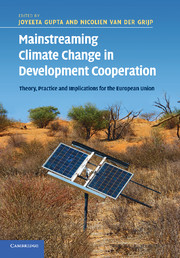 Mainstreaming Climate Change in Development Cooperation
Mainstreaming Climate Change in Development Cooperation 10 - Prospects for mainstreaming climate change in development cooperation
Published online by Cambridge University Press: 07 May 2010
Summary
Between the idea
And the reality
Between the motion
And the act
Falls the Shadow.
T. S. Eliot, The Hollow MenMainstreaming climate change
The development and development aid issue has long been a matter for North–South struggles, unceasing demands and unkept promises. The climate change regime is the latest forum for North–South stress, where old grievances like colonialism and new ones like neo-imperialism merge in a complex pot of interdependence and yet distrust. Interdependence, because the climate change problem cannot be addressed by individual nations alone, distrust because the rules for sharing responsibility for causing the problem and solving it are vague. However, global dynamics and politics are changing rapidly. As the spheres of influence of countries change, as development processes alter rapidly, the global community may be entering an era of unforeseeable economic and political change with unpredictable consequences.
Against this background, the literature on and governance over six decades of official development cooperation and two decades of climate cooperation have been examined with a view to determining whether these two forms of cooperation can learn from each other and whether climate change cooperation should be incorporated into development cooperation. This concluding chapter synthesizes the arguments made in the previous chapters in a final integrated analysis. It may be relevant to state upfront that this chapter differentiates between mainstreaming climate change into development and mainstreaming climate change into development cooperation.
- Type
- Chapter
- Information
- Mainstreaming Climate Change in Development CooperationTheory, Practice and Implications for the European Union, pp. 303 - 343Publisher: Cambridge University PressPrint publication year: 2010
References
- 4
- Cited by


